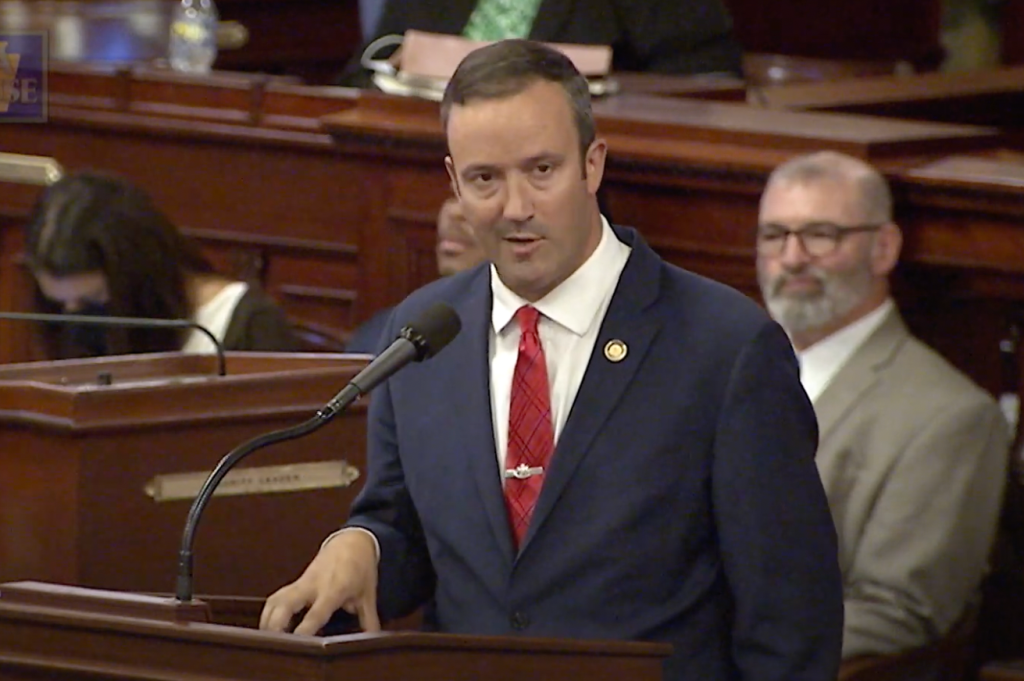Pennsylvania Democrats over the past few months have put on a masterclass in political ruthlessness. Although they entered the legislative session in the state House of Representatives a few vacant seats shy of a majority, Democrats have since seized power through a series of shrewd — and arguably shameless — moves.
Democrats first managed to win a one-seat House majority during the midterm elections, but three of the seats became vacant due to a death, a resignation and a promotion. This meant the GOP technically held a majority at the start of the session, but Republicans recognized that Democrats would almost certainly win the majority back in February when the three special elections were decided.
Instead of installing their own speaker, Republicans decided to make a backroom deal with the Democrats. Some of them would cross party lines and vote for Representative Mark Rozzi, a moderate Democrat, to lead the House, but only if he changed his party affiliation to independent and acted as a non-partisan arbitrator of House business.
Rozzi reneged on the deal. Not only did he fail to change his party affiliation, but he apparently had no intention of remaining speaker when Democrats retook their one-seat majority. On the last day of February, Rozzi announced he was stepping down as speaker to clear the way for Democratic representative Joanna McClinton, a radical progressive, to hold the gavel.
McClinton moved quickly to consolidate Democratic power, even as rumors swirled around Harrisburg that a member of her party was about to be named in a sexual harassment scandal. On March 1, Democrats began the process to implement a House rules package that would govern the body for the next year. The first order of business was to limit debate and prevent Republicans from offering any amendments to the rules.
As the partisan rules package moved to a vote, a news story dropped naming Democratic representative Mike Zabel as the member that had allegedly groped a lobbyist back in 2019 and had sexually harassed female lawmakers.
Andi Perez, a lobbyist for Service Employees International Union 32BJ, first shared her story without naming the alleged groper during a listening tour with then-Speaker Rozzi earlier this year. A GOP insider said it was common knowledge at that time that she was talking about Zabel. Lending credence to the source’s claim is the fact that Zabel’s former campaign manager previously reported her concerns about Zabel’s behavior with women and problems with alcohol abuse to Democratic leadership.
“Zabel’s transgressions were long the worst kept secret in Harrisburg,” the source told The Spectator. “Members of the legislatures and lobbyists alike knew for months that Zabel had been the known groper in the legislature.”
Republican female lawmakers at the time also called on Democrats to investigate Perez’s allegation and oust the offending member.
In a separate incident in November 2022, which the source was a witness to, Zabel peppered a Republican state congresswoman with compliments, tried to get her to come up to his hotel room and followed her out to her car. The congresswoman repeatedly rejected Zabel’s advances — and a male friend intervened in the situation.
Democrats, nonetheless, claimed they first learned of the allegations against Zabel from the news story published March 1.
“We are concerned by the allegations we learned today, and take such accusations seriously,” a statement from the Democratic caucus said.
Republican minority leader and former speaker Bryan Cutler sought recognition on the floor during the rules vote so that the body could discuss the allegations against Zabel and determine the best path forward. State Republican representative Martina White asked if someone should be allowed to vote if they have a “credible pending sexual harassment… accusation against them.” The question was particularly timely because the rules package included changes to the process for reporting sexual misconduct claims to the House Ethics Committee.
McClinton, despite being publicly painted as a social-justice champion, ignored the complaints and forced the rules to a vote. The rules passed on a party line vote, 102-100.
Earlier in the day, Zabel was selected to serve on the Judiciary Committee even as lawmakers apparently knew that a story about Zabel’s alleged sexual misconduct was dropping imminently.
Zabel initially said in response to the allegations that he would resign his role on Judiciary but would not leave his seat in the House. He intended to defend himself in front of the House Ethics committee.
“My illness has caused some behavior that I regret, and I agree that additional intervention is necessary for me to fully recover,” Zabel said in a statement.
He later reversed course, indicating that he would, in fact, resign from the House because he wanted to protect his family.
“The toll is just too great on my family, and was too detrimental to my wellbeing. I need to focus on what matters,” he said.
Zabel was not the deciding vote on the rules package because Republicans currently have their own House vacancy pending another special election in May. But even though Zabel’s resignation will leave them with a mere one-seat majority for several months, Democrats will still have an outsized role on committees: the committee divide in the new rules package is 12-9.
Perhaps more importantly, Zabel’s resignation will not become official until March 16 — the deadline to schedule a special election in May. This gives Speaker McClinton, the leader of the party that is accused of ignoring Zabel’s behavior for years, the power to decide whether his seat will be filled by a special election during the May primary or November general. And Zabel presumably gets to collect another paycheck while he runs out the clock.
If Zabel’s seat is held open until November, the House would likely sit at a 101-101 tie. But Democrats would still enjoy majority power. Why? Their rules package defines “majority party” as “the political party that won the greater number of elections … in the general election preceding the term of service.”
Representative White told Broad & Liberty that the Democrats intentionally ignored the allegations against Zabel to protect their slim majority heading into the House speaker and rules votes.
“This is solely about maintaining power,” White said. “They wanted to make sure Representative Zabel was on the floor to vote for Leader McClinton to become speaker of the House. It’s a complete disgrace.”


























Leave a Reply